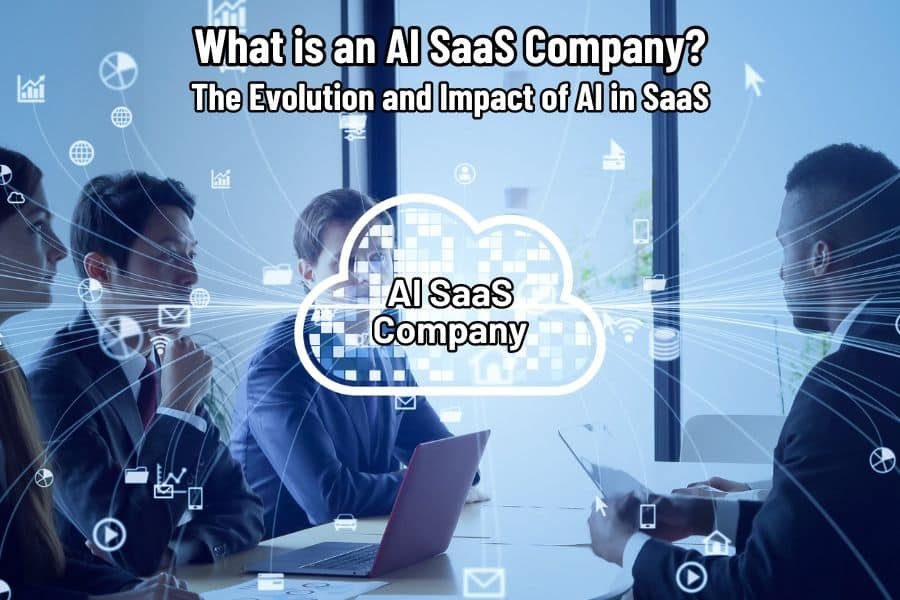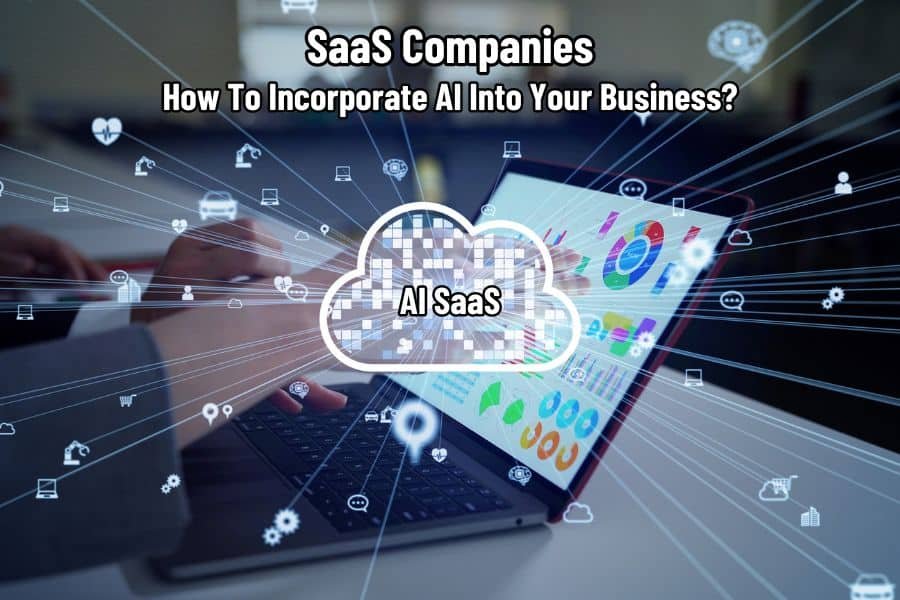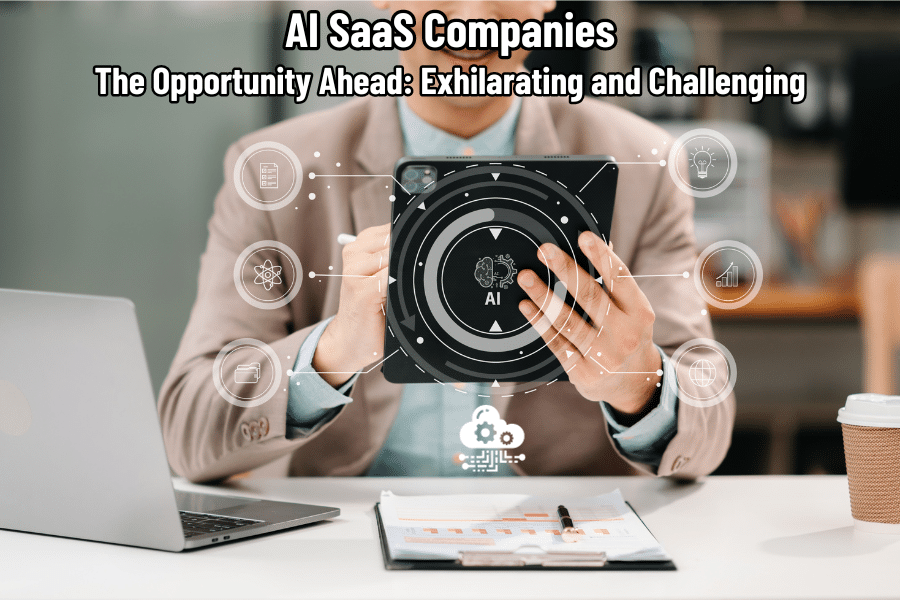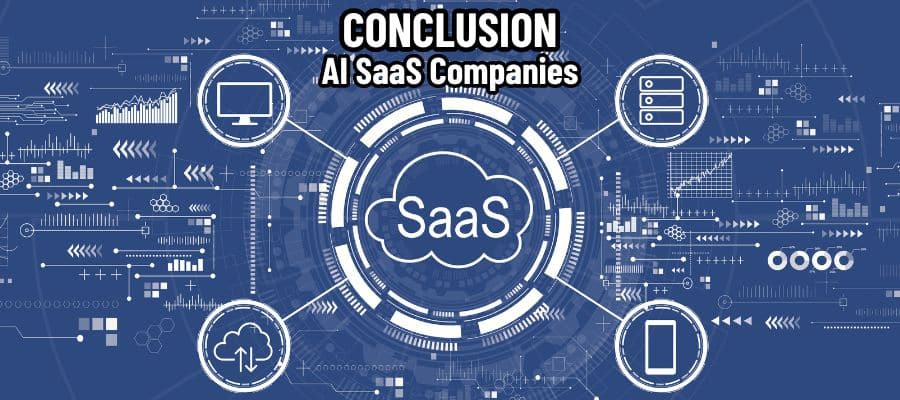AI SaaS companies are reshaping the business world, offering innovative solutions and unparalleled efficiency. Discover how these companies are driving the AI revolution, their role in transforming industries, and the vast opportunities they bring to the future of SaaS technology.
Introduction
In a world swirling with technological innovations, AI SaaS companies stand at the forefront, not just participating in the AI revolution, but actively leading it. Think of them as the conductors of an orchestra, where every instrument is a cutting-edge AI tool designed to harmonize the way we do business.
In this post, we’ll dive into the realm of AI SaaS companies, unravelling what they really are and why they’re pivotal in today’s digital narrative. We’ll wade through key statistics and trends, showing how AI isn’t just a buzzword but a fundamental pillar in the SaaS landscape. Understanding the mutual benefit of AI and SaaS, we explore ten ways in which AI is transforming these companies, offering insights that could reshape your thinking.
But how do these transformations happen? We’ll guide you through integrating AI into your SaaS business, ensuring it’s not a leap in the dark but a strategic step towards innovation. Looking ahead, we’ll sketch out the opportunities this synergy of AI and SaaS holds, not just to catch up with the times but to lead the charge into the future.
We’re not just talking about change; we’re talking about revolution — a shift in how we perceive, utilize, and innovate in the world of SaaS. So, if you’re curious about how AI SaaS companies are writing the playbook for the next era of digital solutions, this post is your gateway to understanding the intricacies and the genius of this transformative alliance.
What is an AI SaaS Company?

Defining AI SaaS
An AI SaaS company isn’t just a fancy amalgamation of buzzwords; it’s the epicenter of a significant shift in how we handle tech solutions. Imagine a software application that’s not only accessible over the internet but also infused with the power of artificial intelligence. This integration allows these platforms to not only store data but to learn from it, predict outcomes, and personalize experiences at scale. It’s like having a smart assistant who not only knows the ins and outs of your business processes but also anticipates your needs and evolves with them.
AI in a SaaS framework turns the conventional software model on its head. Instead of a one-size-fits-all software solution, AI SaaS companies deliver systems that adapt, learn, and grow. They break down the complex, often intimidating world of AI, making it accessible and actionable for businesses of all sizes. This democratization of AI through SaaS means that now, more than ever, cutting-edge AI solutions aren’t just the playground of the big players; they’re available to everyone.
The Evolution and Impact of AI in SaaS
The journey of AI integration into SaaS is both fascinating and pivotal. Initially, SaaS platforms focused on delivering software over the internet, removing the need for local installations and constant updates. However, as the volume of data and the speed of business accelerated, the need for smarter, more adaptive solutions became clear. Enter AI — with its ability to process and analyze vast amounts of data, learn patterns, and make predictions.
The impact? Substantial. An AI SaaS company leverages AI to turn data into insights, bringing about efficiency that traditional software could never achieve. Think automated customer service that understands and solves user problems in seconds, or dynamic pricing models that shift based on real-time market analysis. The evolution has led to more personalized, predictive, and efficient services, redefining customer expectations and experiences.
Examples of Prominent AI SaaS Companies
To put this into perspective, let’s consider some frontrunners. Salesforce, with its Einstein AI, is a prime example. It offers CRM solutions that not only manage customer interactions but also predict customer needs and behaviors, empowering businesses to stay a step ahead. Then there’s IBM with Watson, integrating AI into diverse business operations, from healthcare solutions to financial services, showcasing AI’s vast potential.
Another trailblazer is HubSpot, which has seamlessly integrated AI into its marketing, sales, and service software, offering businesses an edge in automation and analytics. These companies exemplify how AI SaaS isn’t just about upgrading software; it’s about reimagining and revolutionizing how businesses operate, interact, and grow in the digital age.
In each example, AI is the key differentiator, the driving force that propels ordinary SaaS offerings into realms of unprecedented personalization, efficiency, and scalability. What makes these AI SaaS companies stand out isn’t just their use of AI; it’s their commitment to making AI accessible, usable, and beneficial for all businesses, heralding a new era of intelligent digital solutions.
AI in SaaS: Key Statistics and Trends

Current Market Size and Growth Projections
The landscape of AI in SaaS is not just expanding; it’s exploding. Recent market analyses show that AI SaaS companies are not merely riding the wave of growth—they are creating it. Current estimates put the global AI software market at tens of billions, with projections skyrocketing in the coming years. This isn’t surprising, considering AI’s role in revolutionizing how businesses operate and scale. The growth projection of AI in SaaS underscores a critical shift in the market: companies are increasingly recognizing the value of AI-powered tools in enhancing productivity, customer experience, and decision-making processes.
The rapid expansion of AI in SaaS can be attributed to several factors, including increased accessibility of AI tools, advancements in machine learning algorithms, and a growing awareness among businesses about the benefits of AI integration. Small and medium-sized enterprises, previously hindered by resource limitations, are now major contributors to this growth, thanks to AI SaaS platforms offering scalable, cost-effective solutions. This democratization of AI technology signals a pivotal change in the way companies of all sizes approach their business strategies and growth plans.
Emerging Trends in AI SaaS
Staying ahead in the AI SaaS arena means keeping an eye on emerging trends. One significant trend is the shift towards more personalized and conversational AI. As AI algorithms become more sophisticated, we’re seeing a surge in AI-driven personalization engines and chatbots across various industries, offering a more intuitive and tailored customer experience. Another notable trend is the increasing use of AI for predictive analytics in business operations. This goes beyond traditional data analysis, enabling companies to anticipate market changes, consumer behaviors, and potential risks with greater accuracy.
AI is also making its mark in the realm of automation, especially in mundane and repetitive tasks. This shift not only enhances efficiency but also frees up valuable human resources for more strategic, creative roles. Furthermore, AI’s role in enhancing cybersecurity within SaaS platforms is becoming increasingly vital. With the growing sophistication of cyber threats, AI’s ability to predict, detect, and respond to these threats is crucial for maintaining trust and integrity in SaaS solutions.
Impact of AI on SaaS Business Models
The infusion of AI into SaaS has a transformative impact on business models. Traditional SaaS models, predominantly subscription-based, provided businesses with a range of software solutions hosted on the cloud. The integration of AI into this model has led to the emergence of more dynamic, usage-based pricing strategies. Companies can now offer more customized solutions, tailoring their services to the unique needs and usage patterns of their clients. This not only enhances customer satisfaction but also introduces new revenue streams and pricing models for SaaS providers.
Another impact of AI in SaaS is the shift towards outcome-as-a-service models. Unlike the traditional focus on selling software products or services, AI SaaS companies are increasingly focused on delivering specific business outcomes. This might include improving customer engagement, enhancing operational efficiency, or driving sales growth. By leveraging AI’s capabilities in data analysis and machine learning, SaaS providers can offer more than just tools—they’re offering solutions and results directly tied to their clients’ business objectives. This evolution reflects a deeper partnership between providers and users, where success is mutually and directly aligned.
10 Ways A SaaS Company Can Benefit From AI

Enhancing Customer Experience
AI’s role in enhancing customer experience is perhaps one of its most celebrated feats in the realm of SaaS. AI SaaS companies leverage sophisticated AI in software to understand customer behaviors, preferences, and pain points, tailoring their interactions accordingly. Imagine AI-powered chatbots and virtual assistants providing real-time, 24/7 customer support. These tools can handle a range of queries, from troubleshooting to giving personalized product recommendations, ensuring customers feel heard, understood, and valued. The result? Increased customer satisfaction, loyalty, and ultimately, a stronger brand reputation.
Streamlining Operations with AI
Efficiency is the lifeblood of any thriving SaaS company, and AI is the powerhouse behind this efficiency. By integrating AI, businesses can automate routine tasks, optimize workflows, and streamline operational processes. This not only speeds up operations but also minimizes human errors. AI can manage everything from scheduling to reporting, allowing teams to focus on more strategic tasks that require human insight and creativity. This smarter way of working translates into faster, more agile business responses, giving AI SaaS companies a significant edge over competitors.
AI in Data Analytics and Decision Making
In the data-rich environments of today’s businesses, AI plays a crucial role in extracting actionable insights from vast datasets. AI in software analytics means more than just number crunching; it’s about understanding patterns, predicting trends, and making informed decisions. With AI’s ability to process and analyze data at scale, SaaS companies gain deeper insights into market dynamics, customer preferences, and potential growth opportunities. This intelligence drives smarter, data-driven decision-making, aligning business strategies with actual market needs.
Improving Security and Compliance
Security and compliance are paramount in the digital world, and AI brings a new level of prowess to these areas. AI SaaS companies are using AI to enhance security protocols, detect and prevent fraud, and ensure regulatory compliance. AI algorithms can monitor and analyze user activities, flagging any unusual patterns that might indicate a security breach. In compliance, AI helps in understanding and keeping up-to-date with ever-changing regulations, ensuring businesses operate within legal frameworks, thus safeguarding both the company and its customers.
Personalization and AI-Driven Recommendations
Personalization is no longer a luxury; it’s an expectation. AI excels in delivering personalized content, product recommendations, and services by analyzing individual user data. This capability enables SaaS companies to offer uniquely tailored experiences, ensuring users find exactly what they need, often before they even realize they need it. From customizing user interfaces to delivering personalized email campaigns, AI’s deep learning capabilities make every interaction count.
AI in Marketing and Sales Optimization
AI transforms how SaaS companies approach marketing and sales, offering precision and efficiency. Through predictive analytics, AI helps in identifying and targeting potential leads more effectively, increasing conversion rates. In sales, AI tools can predict customer needs, suggest the most effective upselling and cross-selling opportunities, and even assist in closing deals by providing sales reps with real-time, data-driven insights.
Reducing Operational Costs
Cost reduction is a critical benefit of AI for SaaS companies. By automating various functions such as customer service, data entry, and even certain aspects of content creation, AI helps in trimming down labor costs and operational expenses. Additionally, AI-driven energy and resource management systems enable businesses to operate more sustainably, reducing utility costs and minimizing waste.
Enabling Predictive Maintenance
Predictive maintenance is revolutionizing how SaaS companies manage their infrastructure. AI algorithms analyze data from various sources to predict potential failures or issues before they occur. This foresight allows for maintenance and repairs to be conducted proactively, minimizing downtime, extending the life of the equipment, and ensuring uninterrupted service for users.
AI in Talent Management and HR
AI is redefining talent management and HR in the SaaS sector. From streamlined recruitment processes using AI-powered applicant tracking systems to enhanced employee engagement and retention strategies, AI is making HR operations more efficient and effective. AI tools can analyze employee feedback and performance data, helping HR professionals in identifying training needs, boosting morale, and nurturing a productive workplace culture.
Innovations in AI for Product Development
In product development, AI is a game-changer for SaaS companies. It offers powerful insights into user behavior and market trends, guiding the development of new features and products. AI can also speed up the development process itself, from automated testing to advanced simulation tools. These innovations not only enhance the product’s relevance and usability but also significantly shorten the time to market, keeping the company ahead in the competitive SaaS industry.
SaaS Companies: How To Incorporate AI Into Your Business?

Incorporating AI into your SaaS business isn’t just about jumping on a new trend; it’s about strategically enhancing your services, operations, and customer engagement. The journey of embedding AI into your business practices can be transformative, empowering your business to operate smarter, deliver value faster, and stay ahead in the competitive curve. Let’s explore how digital entrepreneurs are incorporating AI into their business effectively.
Assessing Your AI Readiness
Before diving into the world of AI, it’s crucial to evaluate your company’s readiness for this advanced technology. Start by reviewing your existing infrastructure and datasets. Do you have the capacity to store and process large amounts of data required for AI? If not, this might be where your journey begins – upgrading your hardware and software. Next, assess your team’s skill levels. Do you have AI experts in-house, or do you need to invest in training or hiring? Understanding where you stand in terms of technology, data, and skills provides a clear starting point for your AI journey and helps in setting realistic goals and timelines.
Additionally, consider the data you have at your disposal. AI requires quality data to train models. If your data is fragmented, incomplete, or not systematically organized, prioritize data management and quality control. This foundation is not just crucial for AI implementation but also enhances overall business efficiency.
Identifying AI Opportunities in Your Business
To effectively harness AI, identify areas within your business that can significantly benefit from automation and intelligent analysis. Common starting points include customer service (via AI chatbots), sales (predictive analytics for lead scoring), and marketing (personalized content and campaign optimization). However, the opportunities for AI in your SaaS business extend beyond these.
Conduct an audit of your business processes to uncover repetitive tasks, data-intensive activities, and decision-making bottlenecks. AI’s strength lies in managing these efficiently. For example, AI can optimize routing and prioritization in customer support or analyze customer usage patterns for better product recommendations. The key is to find where AI can have the most significant impact – either by enhancing user experience, reducing costs, or driving revenue.
Building vs. Buying AI Capabilities
Deciding whether to build your own AI solutions or buy off-the-shelf products is a critical strategic choice. Building in-house gives you control over the solution and enables customization specific to your needs. If you have a unique value proposition or specialized needs, this might be the path for you. However, it requires substantial investment in talent, time, and technology.
On the other hand, buying or subscribing to existing AI solutions can be cost-effective and quicker to deploy. Many AI tools and platforms are adaptable and can be integrated with your existing systems with minimal fuss. Evaluate the cost, time, and resources for both options in the context of your specific business needs and strategic goals.
Partnerships and Collaborations for AI Integration
Building AI solutions from scratch can be daunting, particularly for smaller SaaS companies. One effective way to accelerate your AI journey is through partnerships and collaborations. Look for partnerships with AI technology providers, research institutions, or other companies that complement your AI aspirations. These collaborations can provide access to advanced AI tools, expertise, and insights that might be challenging to develop in-house.
When seeking partnerships, focus on alignment in vision, goals, and complementary strengths. A good partnership can help you leverage AI more efficiently, allowing you to focus on your core competencies while collaborators handle the intricacies of AI technology.
Best Practices for AI Adoption in SaaS
Adopting AI in your SaaS company should be a thought-out process, following best practices to ensure success. First, start small. Pilot with a single project or department before scaling up. This approach allows you to measure impact, learn from experiences, and iterate. Ensure transparency with your team and customers about how AI is being used, particularly around data usage and privacy.
Training and development are also crucial. Equip your team with the necessary skills and understanding of AI to leverage its full potential. Finally, keep an eye on the ethical implications of AI. Ensure that your AI systems are fair, unbiased, and transparent. AI’s power in a SaaS setting comes not just from its technological capabilities, but also from how it’s ethically and effectively integrated into your business strategy.
AI SaaS Companies: The Opportunity Ahead

The landscape for AI SaaS companies is not just evolving; it’s expanding at a pace that’s both exhilarating and challenging. In this whirlwind of change, opportunities abound for those ready to seize them. Let’s delve into the potential markets and industries ripe for AI SaaS expansion, the enduring benefits, the burgeoning technologies on the horizon, and the challenges that need navigating.
Potential Markets and Industries for AI SaaS Expansion
The realm of AI SaaS ideas is as vast as it is varied. From healthcare, leveraging AI for diagnostic assistance and patient data management, to retail, using AI for personalized shopping experiences and inventory optimization, the applications are nearly endless. In finance, AI SaaS products can revolutionize fraud detection and risk assessment. In manufacturing, AI can streamline supply chain management and predictive maintenance.
Emerging markets such as edtech and agritech are also showing a keen interest in AI SaaS solutions, tapping into AI’s potential to customize learning experiences or optimize agricultural practices. As technology advances, we’ll see AI SaaS expanding into more niche markets, each with specific needs that AI can address in innovative ways. This expansion isn’t just about entering new markets; it’s about revolutionizing them.
Long-term Benefits of AI for SaaS
Embedding AI into SaaS doesn’t just offer a competitive edge; it paves the way for sustainable, long-term growth. AI’s ability to process and analyze vast amounts of data can lead to more informed decision-making, helping businesses stay agile and adaptive in dynamic markets. Furthermore, AI enhances customer engagement through personalization, predictive analytics, and improved customer service, leading to higher retention rates.
From an operational standpoint, AI can optimize resource allocation, streamline workflows, and reduce human error, leading to increased efficiency and reduced operational costs. As AI continues to evolve, these benefits will only deepen, with AI becoming a fundamental driver of innovation, efficiency, and customer satisfaction in the SaaS industry.
Future Technologies and AI Advancements
Looking ahead, the horizon is brimming with potential for AI SaaS products. Innovations like quantum computing could exponentially increase the power and speed of AI, unlocking new capabilities in data processing and analytics. The advancement of natural language processing and machine learning could lead to more intuitive and intelligent AI systems, capable of understanding and predicting user needs with unprecedented accuracy.
Another exciting frontier is the integration of AI with emerging technologies like blockchain, offering enhanced security and transparency for SaaS applications. Augmented reality (AR) and virtual reality (VR) are also areas where AI can play a pivotal role, creating more immersive and interactive experiences. As these technologies mature, the ability of AI to integrate and elevate them within the SaaS model will be a game changer.
Challenges and Considerations for AI SaaS Companies
Navigating the AI SaaS landscape isn’t without its hurdles. One of the foremost challenges is ensuring data privacy and security. As AI systems rely heavily on data, companies must safeguard this data against breaches and comply with evolving regulations like GDPR and CCPA.
Another challenge is the ethical use of AI. Companies must be vigilant against biases in AI algorithms that could lead to unfair or discriminatory outcomes. This requires a continuous effort in training AI models and scrutinizing them for implicit biases. Additionally, as AI technology evolves, there’s the challenge of keeping up with rapid advancements and integrating them seamlessly into existing SaaS offerings. Companies need to foster a culture of continual learning and adaptation to stay at the forefront of AI SaaS innovation.
Conclusion

As we wrap up our exploration into why AI SaaS companies are not just participating in but actively leading the AI revolution, a few key points stand out. AI SaaS companies, by harnessing the power of artificial intelligence, are at the forefront of innovation, driving changes that are reshaping entire industries. They’re not just solving old problems in new ways; they are discovering new problems to solve, thereby expanding the market itself.
The integration of AI into SaaS has revolutionized how businesses operate, offering enhanced customer experiences, streamlined operations, and decision-making powered by data analytics. The potential for AI within SaaS is vast, with opportunities sprawling across various industries, from healthcare to retail, finance to manufacturing. The shift isn’t just technological; it’s cultural, pushing companies towards more data-driven, customer-centric approaches.
However, as with any significant shift, challenges such as data security, ethical AI use, and keeping pace with rapid technological advancements are ever-present. These are not just hurdles to overcome but opportunities for AI SaaS companies to lead by example, setting standards in innovation, responsibility, and trustworthiness. The AI revolution in the SaaS sector is just beginning, and the future, though filled with uncertainties, is ripe with possibilities. Companies that can navigate this landscape with agility, foresight, and a commitment to continuous learning will not just thrive; they’ll lead the charge into a new era of digital transformation.
Frequently Asked Questions

What is AI SaaS and How Does It Differ From Traditional SaaS?
AI SaaS (Artificial Intelligence Software as a Service) combines the cloud-based service model of SaaS with AI technologies, offering smarter, self-improving solutions over time. Unlike traditional SaaS that provides static software solutions, AI SaaS systems are dynamic, learning from data to continuously enhance functionality, personalization, and user experience. This means more intuitive interfaces, predictive analytics, automated processes, and personalized customer service.
How Can Businesses Trust the Reliability of AI in SaaS?
Businesses can trust AI in SaaS by scrutinizing the AI’s training data, understanding the AI decision-making process, and checking the vendor’s compliance with industry standards and regulations. Reliability also hinges on the AI’s performance consistency, which can be evaluated through trials or demos. Regular updates and transparent communication from the service provider about how the AI system evolves also build trust in its reliability.
What Are the Cost Implications of Integrating AI into SaaS?
Integrating AI into SaaS can be seen as an investment in efficiency, customer satisfaction, and long-term savings. Initially, it may seem like a significant expense due to development, implementation, and training costs. However, AI’s ability to automate and optimize tasks reduces long-term operational costs, improves decision-making, and drives better revenue through enhanced customer experiences. In the long run, AI integration can lead to substantial cost savings and a strong ROI.
What Types of AI Technologies Are Common in AI SaaS?
Common AI technologies in AI SaaS include machine learning algorithms for predictive analytics, natural language processing (NLP) for enhancing customer service interactions, and AI-driven automation tools for streamlining business operations. These technologies are adept at analyzing large volumes of data to identify trends, automate repetitive tasks, and provide insightful business intelligence.
How Does AI SaaS Enhance Customer Experience?
AI SaaS enhances customer experience by providing personalized interactions, quick and accurate customer service, and anticipating customer needs. AI can analyze customer data to tailor recommendations, automate responses to common inquiries, and provide intelligent support chatbots. These features ensure a seamless, engaging, and highly personalized customer journey.
Can Small Businesses Benefit from AI SaaS?
Absolutely! Small businesses can significantly benefit from AI SaaS, as it levels the playing field with larger competitors by providing access to sophisticated AI tools without the need for large upfront investments in hardware or specialized staff. AI SaaS can help small businesses analyze market trends, understand customer behavior, automate routine tasks, and optimize their operations, allowing them to compete more effectively and grow their businesses efficiently.
Resources

To deepen your understanding of AI SaaS companies and stay at the forefront of this rapidly evolving field, a variety of resources are available. Here’s a guide to some of the most informative and insightful types, each offering a unique perspective or valuable information.
Articles and Reports
For AI SaaS companies or those aspiring to integrate AI into their SaaS solutions, staying updated with the latest trends and in-depth analyses, articles and reports are invaluable. Look for publications from reputable sources like Harvard Business Review, MIT Technology Review, or industry-specific journals. Reports from market research firms such as Gartner, Forrester, and IDC offer comprehensive insights into market trends, predictions, and emerging technologies in the AI SaaS domain. These written resources can be ideal for getting a snapshot of the current landscape and future projections.
Books
For AI SaaS companies, books offer a more comprehensive look, ideal for understanding the broader context and history. For a start, “Prediction Machines: The Simple Economics of Artificial Intelligence” by Ajay Agrawal, Joshua Gans, and Avi Goldfarb provides an insightful look into how AI is changing the business world. For a focus on the impact of AI in software, “Artificial Intelligence for SaaS” by [Author’s Name] might be an excellent resource, delving into specifics of applying AI in a SaaS business model.
Case Studies
For AI SaaS companies, case studies are gold mines for real-world insights and practical examples of how AI SaaS is being implemented and leveraged across industries. These studies, available on company websites or business analysis platforms like Harvard Business Review, provide a detailed look at specific challenges, strategies, and outcomes of AI SaaS implementations. They’re particularly useful for business leaders and managers seeking to understand the practical applications and results of AI in the SaaS sector.
Podcasts
For AI SaaS companies who prefer audio content, podcasts offer a great way to gain insights on the go. Listen to episodes from shows like “AI in Business” or “SaaS Revolution Show” where hosts discuss the latest trends, interview industry experts, and explore case studies around AI SaaS. They can be a fantastic way to get different perspectives and hear directly from leaders and innovators in the field.
Tools
For AI SaaS companies exploring tools and platforms is essential. Platforms like, TensorFlow, IBM Watson, and Google Cloud AI offer frameworks and environments to develop and deploy AI models. For analytics, look into tools like Tableau or Microsoft Power BI, which can help make sense of the data crucial for AI implementations. Most of these tools offer trial versions, so you can get hands-on experience before making a decision.
Each of these resources provides a unique lens through which to view the dynamic and exciting world of AI SaaS companies. By exploring a combination of these materials, you’ll gain a well-rounded understanding and stay updated on the latest developments in this innovative field.
Best All-In-One AI SaaS Soultion: [JOIN HERE FOR FREE]





